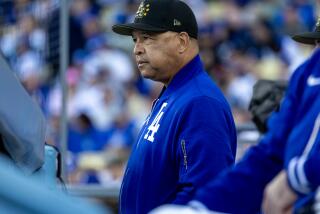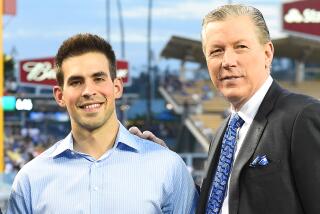ADDRESS TO IMPRESS
WASHINGTON — Ari Fleischer no longer walks the corridors of power. He works on the fifth floor of a generic office building here, across the street from Gap, Ann Taylor and California Pizza Kitchen.
As the presidential press secretary for the first two years of the Bush administration, Fleischer handled the daily briefing, delivering the White House message to a worldwide audience.
Now, after a year spent writing his memoirs and making speeches, he wants to coach.
Specifically, he wants to be a pitching coach. He believes he can help athletes, coaches, teams and leagues make their pitches to the media, teach them what to say and what not to say, advise them how to handle all those annoying questions.
He is attending this week’s Republican National Convention in New York, but not in any official capacity. He is a sports fan who wants to work in sports, which makes him no different from millions of other Americans. At 43, he has spent his working life in politics, having spoken on behalf of various candidates, committees and elected officials for two decades.
Yet he considers himself highly qualified, citing what he calls the “surprisingly striking and similar” live coverage and daily scrutiny of politics and sports.
“When ... Bush lost the New Hampshire primary [in 2000], within moments of his loss, the press was asking, ‘Are you going to fire [campaign strategist] Karl Rove?’ When people said Dick Cheney was unpopular, at the beginning of this year, the press was asking, ‘Are you going to dump Cheney from the ticket?’ ” Fleischer said.
“In pro football, if your team starts out 0-3, the question is going to get asked: Are you going to fire the head coach?”
Crisis management appeals to Fleischer, given his experience in crafting a message and sticking to it. He offers a suggestion for helping lift what Cal Ripken calls “the black cloud of steroids” from baseball, at a time public relations on the issue consist of little more than the union saying nothing and Commissioner Bud Selig pointing a finger at the union and saying he is helpless to tighten a drug-testing policy even he considers weak.
“I think the communication that is happening on the steroid issue has not put either the league or the players’ union in the best light,” Fleischer said. “They haven’t presented their case in a way that makes the fans feel confident.
“This is a wonderful and rare opportunity for the union and the league to join together and show the public they mean it -- no steroids, none, zero.”
The union’s silence is partly the result of a difficult position in this era of sound bites. The union is opposed to steroid use but is concerned about balancing stricter testing with rights of privacy and constitutional principles regarding unreasonable search and seizure.
“I think fans want to know that the action on the field is driven by the God-given gifts of the athletes and not tinkered with because of steroids,” Fleischer said. “And I think many of the players are willing to have a more stringent requirement to protect the integrity of the game. There don’t have to be roadblocks. Look at the Olympics.”
Union leaders bristle at any comparison to the Olympics, whose athletes must adhere to a strict drug-testing regimen adopted without representation on their behalf.
“Maybe that’s an indication that there’s a difference between the way the athletes themselves feel about things and some of their representatives,” he said.
As a baseball fan above all, Fleischer had “the time of my life” last year, when he addressed the annual rookie career-development seminar, jointly conducted by major league owners and the players’ union.
“He talked about how focused he had to be when he talked to the media,” said the Angels’ Chone Figgins, who was in the audience. “Some of the things, he couldn’t really answer. He had to give the answer he was supposed to.”
Said Fleischer: “I talked to them about what it was like when I took the field, when I crossed through the briefing room door and took the podium. I was determined to play my game and say what I was going to say....
“I said, ‘What you need to do is what I do at that podium: Keep your head in the game. Why would you make the mental mistake of saying something stupid to a reporter or let a reporter bait you, because you had a bad game, into snapping? Why would you take your head out of the game in the clubhouse if you’re going to keep your head in the game on the field?’ ”
As the nation’s First Fan, and as the former owner of the Texas Rangers, Bush relished opportunities to welcome athletes and teams to the White House.
“We didn’t exactly have a lot of Hollywood people traipsing through, but we sure had athletes,” Fleischer said.
The timing could have been better for Fleischer, an ardent New York Yankee fan. When the Arizona Diamondbacks visited the White House after beating the Yankees in the 2001 World Series, Fleischer said, Randy Johnson and Curt Schilling “busted my briefing, while I was on live TV, to give me grief for being a Yankee fan.”
And, when the Angels visited after their World Series championship, they gave Fleischer a framed copy of The Times sports page from the day after they’d eliminated the Yankees from the 2002 playoffs. The headline: “The Yankee Rippers.”
“I keep that at home,” Fleischer said, “facing the wall.”
*
(Begin Text of Infobox)
‘The American People Demand Success ... ‘
*
IN HIS OWN WORDS
*
Ari Fleischer weighs in on sports-related topics:
Whether, in the wake of the Sept. 11 terrorist attacks and again in the wake of the death of Pat Tillman, an NFL player who was killed in Afghanistan, media should stop using words such as hero, warrior, battle and courage in describing athletes:
“I think it’s absolutely fine and appropriate for ballplayers to be called those things. Viewers and fans can make the differentiation between those who serve our country on the battlefield and those who provide us wonderful entertainment on the sports field. I have no beef with that. It doesn’t mean we love Pat Tillman any less.
“It just goes to show how deep sports is part of our psyche and how sports touches people. What else can draw tens of millions to watch an event? Sports, and maybe the final episode of ‘Friends.’ ”
*
The lesson to American children when President Bush makes $400,000 a year and Alex Rodriguez makes $25 million a year:
“It’s really hard to hit a curveball.
“I think people make the separation. I think people understand that being president, and serving in government, is not about the money. It’s about principles and fighting for what you believe in.
“The sports world is beloved because it’s such a rarefied world. So few people can make it. The American people demand success from people in both government and sports, regardless of salary. They’ll boo somebody who is 0 for 32 who makes $10 million or $15 million a year. They’ll boo the president. They’ll also cheer both. That’s the way it is.”
*
Whether a Major League Baseball team would succeed in Washington, with the Baltimore Orioles 35 miles up the road:
“I have a sense it would. There’s no question that, because of the D.C. lobbying community and the economic infrastructure of Washington, the suites would be massive sellouts. Whether it would have a fan base that could draw 50,000 to every game, or 35,000 to every game, I don’t know.”
*
-- Bill Shaikin
More to Read
Go beyond the scoreboard
Get the latest on L.A.'s teams in the daily Sports Report newsletter.
You may occasionally receive promotional content from the Los Angeles Times.











